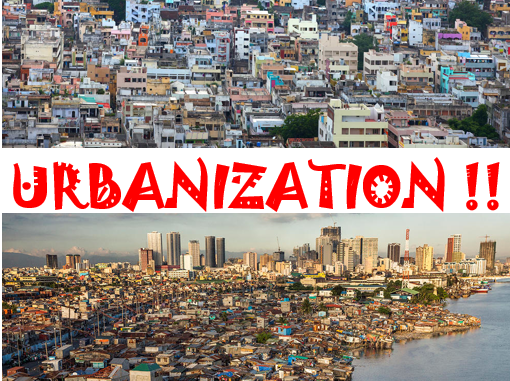Urbanization refers to the population shift from rural to urban areas, resulting in a decrease in the proportion of people living in rural regions. It involves the formation and growth of towns and cities as more individuals reside and work in central urban spaces. By 2050, approximately 64% of the developing world and 86% of the developed world are predicted to be urbanized, impacting land availability, water scarcity, and quality of life. Let’s delve into the causes, consequences, and challenges related to urbanization in India:
Causes of Urbanization in India:
- Industrialization: The growth of industries in urban areas provides job opportunities, attracting rural inhabitants and fueling urbanization.
- Migration: Rural-to-urban migration occurs due to better employment prospects, education, healthcare, and lifestyle in cities.
- Infrastructure Development: Urban centers offer better infrastructure, amenities, and services, drawing people from rural areas.
- Economic Opportunities: Urban regions provide diverse economic activities, leading to increased urbanization.
- Social Factors: Changing social norms, aspirations, and lifestyle preferences contribute to migration to cities.
- Government Policies: Policies promoting urban development and investment play a role in urbanization.
Consequences of Urbanization in India:
- Population Pressure: Cities face overcrowding, leading to strain on resources, housing, and infrastructure.
- Environmental Degradation: Urbanization contributes to pollution, deforestation, and loss of green spaces.
- Health Challenges: Urban areas grapple with air pollution, inadequate sanitation, and health risks.
- Social Disparities: Income inequality, slums, and social fragmentation are common consequences.
- Traffic Congestion: Rapid urbanization leads to traffic jams, affecting productivity and quality of life.
- Housing Shortage: The demand for housing often exceeds supply, resulting in housing crises.
Challenges of Urban Planning and Sustainable Development:
- Inadequate Infrastructure: Urban areas struggle with insufficient roads, water supply, sewage systems, and waste management.
- Unplanned Growth: Haphazard urban expansion without proper zoning and land-use planning leads to inefficiencies.
- Slums and Informal Settlements: Rapid urbanization results in slums lacking basic amenities and services.
- Environmental Impact: Balancing economic growth with environmental conservation is a challenge.
- Governance Issues: Weak urban governance, corruption, and lack of capacity hinder effective planning.
- Social Inequities: Ensuring equitable access to resources and services for all citizens remains a challenge.
- Climate Resilience: Urban areas need to adapt to climate change and build resilience.
- Balancing Economic and Social Goals: Sustainable development requires balancing economic growth with social and environmental well-being.
In summary, urbanization in India presents both opportunities and challenges. Effective urban planning, sustainable development, and inclusive policies are essential to address these complexities and create livable, resilient cities for the future.


